 Petzlover
Petzlover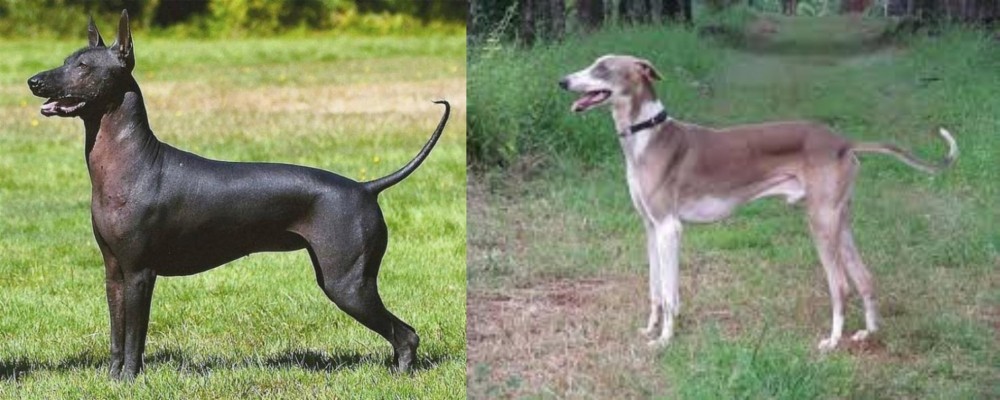 Hairless Khala is originated from Mexico but Mudhol Hound is originated from India. Hairless Khala may grow 31 cm / 12 inches shorter than Mudhol Hound. Hairless Khala may weigh 13 kg / 28 pounds lesser than Mudhol Hound. Both Hairless Khala and Mudhol Hound has same life span. Both Hairless Khala and Mudhol Hound has almost same litter size. Both Hairless Khala and Mudhol Hound requires Moderate Maintenance.
Hairless Khala is originated from Mexico but Mudhol Hound is originated from India. Hairless Khala may grow 31 cm / 12 inches shorter than Mudhol Hound. Hairless Khala may weigh 13 kg / 28 pounds lesser than Mudhol Hound. Both Hairless Khala and Mudhol Hound has same life span. Both Hairless Khala and Mudhol Hound has almost same litter size. Both Hairless Khala and Mudhol Hound requires Moderate Maintenance.
 The Hairless Khala is from a number of Latin American countries, and these countries have a variety of these hairless hounds.
The Hairless Khala is from a number of Latin American countries, and these countries have a variety of these hairless hounds.
The dogs are known by different names. Khala is the Bolivian Quechua Indian name and it means 'no clothing' - an absence of fur. Both Central and South America have their hairless dogs, descendants of ancestral dogs owned by the Incan Empire.
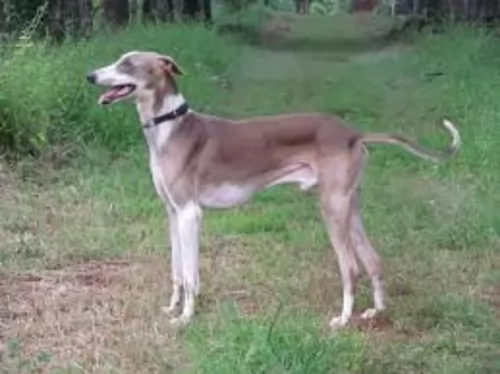 This seems to be the breed of many names. The Mudhol Hound comes from India and has been called the Caravan Hound, the Pashmi, the Karvanit, the Karwaani and the Pisuri Hound. Like so many other Indian breeds, the Mudhol Hound bears a strong look of the Greyhound. He is a sight hound and as such is lean and fast. He is ancient, healthy and loves his people.
This seems to be the breed of many names. The Mudhol Hound comes from India and has been called the Caravan Hound, the Pashmi, the Karvanit, the Karwaani and the Pisuri Hound. Like so many other Indian breeds, the Mudhol Hound bears a strong look of the Greyhound. He is a sight hound and as such is lean and fast. He is ancient, healthy and loves his people.
The ancestors of the Mudhol include the hounds bred by the tribes of Bedar near Mudhol and Halagali. In Maharashtra the Maratha warriors were also breeding hounds which are included in the Mudhol Hound lineage. It is believed that there is Tazi and Saluki heritage in the Mudhol as well.
All of these Indian hounds were good at guarding, hunting and as companions. Then the King of Mudhol began to breed them specially for hunting and succeeded in developing a sleek, slender dog. The King of England at the time, George V, was so impressed he dubbed them the Hounds of Mudhol.
The Mudhol Hound hunts rabbits and other small animals with their incredible sight. No matter if the breed was on a postage stamp in 2005 and is a great family companion, it is first and foremost a working dog. He was specifically bred for the tough working conditions in the mountains of India. They are courageous, loyal and graceful. They are committed to their people but a little standoffish with anyone else and make good guard dogs.
They were used by the Indian Army as border protection and surveillance dogs. They use them for testing of their veterinary corps. They have been deployed by the Army in Kashmir and Jammu in 2017, just as they were centuries ago. They were effective at taking down soldiers and horses alike.
They were also chosen for breeding at the Canine Research and Information Centre, part of the Karnataka Veterinary, Animal and Fisheries Sciences University in Bidar. With a very high prey drive they can get along with other dogs their size but cannot be trusted with smaller pets.
The Indian National Kennel Club lists them as the Mudhol Hound while the Kennel Club of India recognizes them as the Caravan Hound.
 There are 2 kinds of hairless Khalas – the Medio one which is a short legged dog which stands at roughly 36 – 41cm in height and weighs roughly 6 – 14kg. The other kind of khala is the Hairless Khala Grande, a long legged type.
There are 2 kinds of hairless Khalas – the Medio one which is a short legged dog which stands at roughly 36 – 41cm in height and weighs roughly 6 – 14kg. The other kind of khala is the Hairless Khala Grande, a long legged type.
Although the dog is hairless, you'll find some hair on the top of his head. For sake of space we'll refer to the Medio variety, a medium-sized hound with hairless skin which is dark grey in color.
The Hairless Khala is a friendly dog with his family but tends to be reserved with strangers. He gets on well with children in the home and because he isn't a particularly energetic dog, elderly people also find that he makes a super pet for them.
He is able to adapt easily to city- as well as country living. You need to be careful with him and not allow him out in the garden in the boiling sun as his skin can burn badly. Then again, without fur, he also tends to get cold easily.
He has dark brown eyes and the ears are fairly large in size and erect. He has a chest which is deep and broad and his tail is set fairly low and is held according to his mood.
He is an intelligent dog, and therefore easily trained. He is a loving, loyal dog who is capable of bonding closely with his human family.
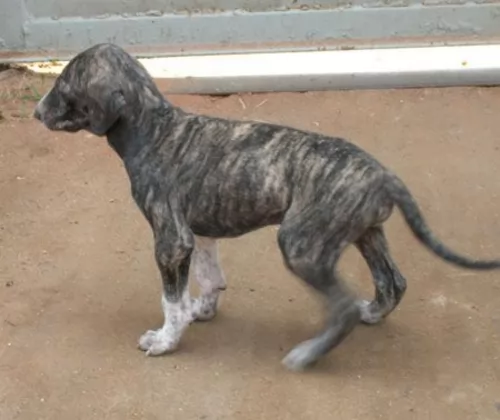 The Mudhol Hound is a good looking sight hound. Slender, sleek, muscular. They have narrow, long heads with a muzzle that tapers. They have long and powerful jaws with a large black nose. Their eyes are oval, large and brown with a look that pierces, and they have long, muscular, and clean shoulders. The legs are straight, long and strong with a broad, muscular, long back. Like most sight hounds when you seen them coming at you straight on, they have the appearance of being one dimensional.
The Mudhol Hound is a good looking sight hound. Slender, sleek, muscular. They have narrow, long heads with a muzzle that tapers. They have long and powerful jaws with a large black nose. Their eyes are oval, large and brown with a look that pierces, and they have long, muscular, and clean shoulders. The legs are straight, long and strong with a broad, muscular, long back. Like most sight hounds when you seen them coming at you straight on, they have the appearance of being one dimensional.
There are two types of coat and many acceptable colors. The coat can be silky on the tail, legs and ears or it can be completely smooth from head to toe. The coat can be grey, black, cream, red, fallow, and fawn. It can also be one of these colors and a small amount of shite blended it.
 The Hairless Khala will make you an excellent pet, and children and the elderly are attracted to the dog because it is loving and docile. They are aloof with strangers, but training and socialization make him far more tolerant of strangers.
The Hairless Khala will make you an excellent pet, and children and the elderly are attracted to the dog because it is loving and docile. They are aloof with strangers, but training and socialization make him far more tolerant of strangers.
The Hairless Khala is an adaptable dog breed, and will adapt well to life in the city or in the country. Found throughout the Latin American nations, today he is essentially a companion dog, loving to be a devoted friend to his human family.
 The life expectancy of this dog is 10-14 years when he is treated well. The Hairless Khala is a robust dog breed but even so, there are diseases to look out for -
The life expectancy of this dog is 10-14 years when he is treated well. The Hairless Khala is a robust dog breed but even so, there are diseases to look out for -
Skin allergies are one of the reasons you may have to take your Hairless Khala to the vet. These sorts of skin allergies can be frustrating for a dog because the skin is irritated and itchy and he may have scaly areas or red bumps on his skin. If your dog is licking and scratching frantically, you will need to get him to the vet.
Periodontal disease is inflammation of the gums, and if food and bacteria accumulate on the gums, it forms plaque and transforms into calculus, leading to gingivitis. Check your pet's teeth regularly and also brush them with special canine toothbrush and toothpaste at least 2 or 3x a week.
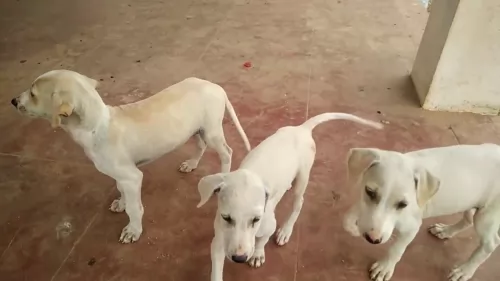 Like so many of the old breeds raised in a lot of isolation, the Mudhol is a very healthy breed. There are no genetic illnesses and they have a long line of dogs able to deal with the weather in India and avoid any sickness. However, they do have a few conditions they are prone to.
Like so many of the old breeds raised in a lot of isolation, the Mudhol is a very healthy breed. There are no genetic illnesses and they have a long line of dogs able to deal with the weather in India and avoid any sickness. However, they do have a few conditions they are prone to.
 He isn't a super energetic dog but still, he will need to be taken for a walk every day.You can also include typical games that all dogs love – fetching a ball or pulling on a rope.
He isn't a super energetic dog but still, he will need to be taken for a walk every day.You can also include typical games that all dogs love – fetching a ball or pulling on a rope.
Because of the dog having little or no hair, they are considered fairly hypoallergenic and also low maintenance. You'd need to brush a dog with fur, but a hairless dog requires different grooming.
Speak to your vet about bathing your dog, the type of body wash to use and how frequently it should be done. Because your dog is hairless, he may require a sun cream in the Summer and a jersey in the Winter.
He will also need his nails clipped and his teeth brushed as part of his grooming process.
He may not have much hair, but when it comes to diet he is much the same as any other dog. If you feed him commercially manufactured food, always choose the best quality one in accordance with his age, height and activity levels.
Home-made food is always a welcome treat for your pet, but whatever you feed him, make sure it has the necessary minerals and vitamins to ensure his health. Essential fatty acids will be needed to keep the skin moist. With too much washing, the skin of these dogs will become irritated, dry and flaking if he doesn't received a nutritious, balanced diet. Make sure he has constant access to fresh, cool water.
When in any doubt as to how to look after a hairless dog, speak to your vet.
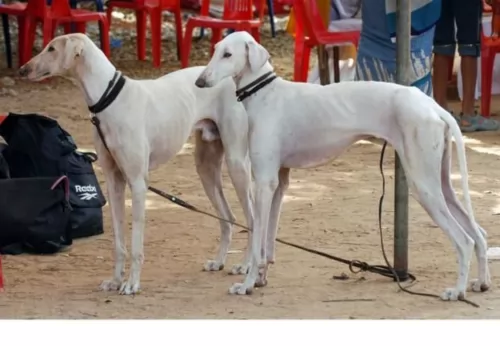 The Mudhol puppy needs a high quality dry food. They should eat three to four times a day in smaller portions. A total of 3 to 3.5 cups per day.
The Mudhol puppy needs a high quality dry food. They should eat three to four times a day in smaller portions. A total of 3 to 3.5 cups per day.
The adult Mudhol should eat about two and a half cups of high quality dry food twice a day. Do not overfeed the Mudhol and don’t let him run right after eating.
Outstanding speed and stamina
This is a high energy, active dog that needs a lot of space and exercise. She needs to be able to run freely as long as she wants at least a couple times a day. He has incredible endurance and a very high prey drive. They must be in a fenced area unless on a leash. They are great at lure coursing, fly ball and agility.